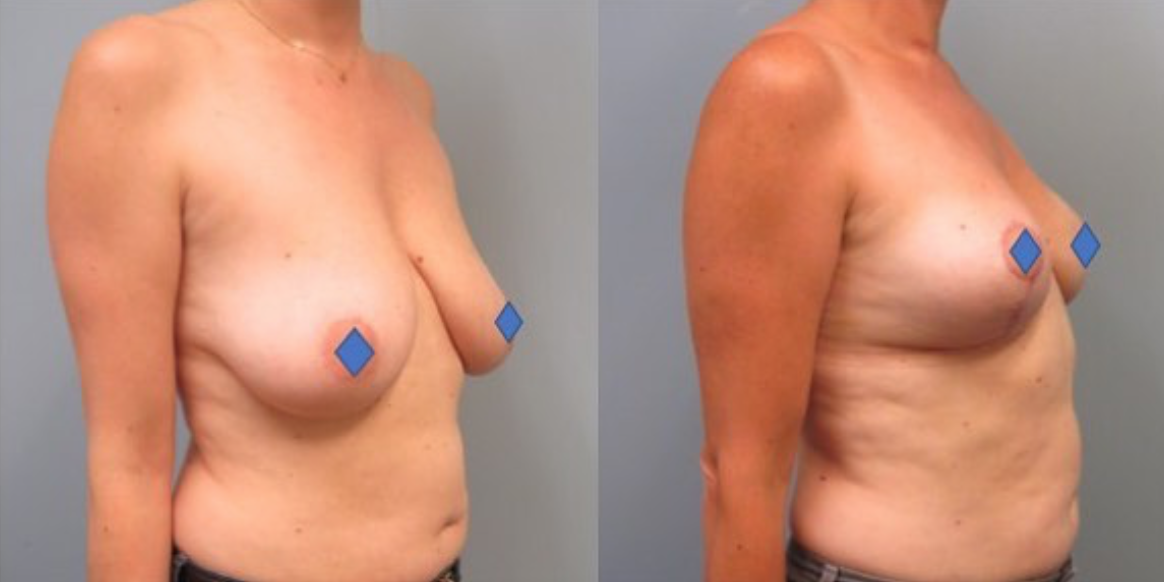
Considering Breast Reduction Surgery?
Breast reduction surgery, also known as a reduction mammaplasty, is a surgery where breast tissue and skin are removed to reduce the size of the breasts while also re-shaping and lifting them. This surgery can not only help to alleviate some of the symptoms associated with large breasts such as back, neck, and breast pain, but also lead to a more youthful-looking breast shape and size.
Most women who seek breast reduction usually have a few things in common. The following issues are often described by women who might benefit from breast reduction surgery:
• You feel as if your breasts are too large or disproportional to your body frame
- Your breasts are heavy and pendulous and your areola and/or nipples point downwards or seem much lower on your chest than you would like
- You have disproportionate breast sizes, where one breast is much larger than the other breast
- You have neck, back, upper shoulder, or breast pain secondary to your large or heavy breasts
- You have chronic skin infections/irritation to the skin underneath your breasts
- You find it difficult to exercise due to your large breast size (or feel the need to wear multiple sports bras to give you the support while exercising) or have trouble finding clothes or bras that fit you
If these symptoms resonate with you, the first step in seeing if you are a good candidate would be to either discuss this with your primary care provider or find a board-certified plastic surgeon in your area and set up a consultation. At that visit, your plastic surgeon will determine if it would be safe and appropriate to recommend a breast reduction for you. If it is, your plastic surgeon will then send your consultation note documenting how much breast tissue he/she thinks would be removed during your surgery to get you to the size you’d like to be and clinical photographs to your insurance company for insurance authorization. For the most part, when women have significant disruptions in activities of daily living as a result of their large and heavy breasts, insurance companies will cover this surgery, though every company is different.
Once you have decided to proceed with breast reduction surgery, your surgeon will discuss the best options for you in terms of incision and technique for the surgery. We like to show patients 3D simulations of what they might look like after a breast reduction using their own photographs, which helps women have a clear sense of what their goals are.
The surgery itself typically takes from three to four hours, is done under general anesthesia (where you are put to sleep with medicine) and it is almost always outpatient surgery (meaning that you get to go home the same day of your surgery). Women tend to do very well after this surgery and may be uncomfortable for the first 24-48 hours, but usually have good pain control with ibuprofen and potentially some stronger pain medication for breakthrough pain if needed in the first week or so.
Recovery after the surgery varies on a multitude of factors, but in general, one week off work or school is expected. Your surgeon will likely have you wear a sports bra for quite some time before transitioning to a regular bra (without underwire for the first three to six months). It is normal to feel like your breasts are heavy and tight – this is from swelling; however, it may take several months for your breasts to settle in and complete healing takes about one year. Most women feel like they can return to normal life activities within two weeks after surgery and are back to full exercise by 4 to 6 weeks.
Breast reduction surgery can be truly life-changing for many women, which is why it’s one of our favorite surgeries to offer! Please contact our office with any additional questions to help decide if breast reduction surgery could be helpful for you.
To Learn More Visit https://annepeledmd.com/



